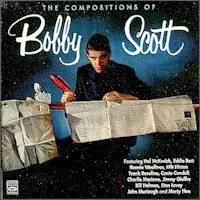Year: 1955
File: MP3@320K/s
Time: 43:37
Size: 100,1 MB
Art: Front
(3:31) 1. Two Toes
(2:45) 2. What's New
(4:53) 3. Between the Devil and the Deep Blue Sea
(3:07) 4. Summer Night
(4:16) 5. Over the Rainbow
(3:05) 6. Squaw Rock
(4:14) 7. Potatoe Zalud
(4:17) 8. These Foolish Things
(3:49) 9. Milt Shake
(6:06) 10. Skyline
(3:30) 11. Richard the Lion Hearted
Robert William Scott (January 29, 1937 – November 5, 1990) was an American musician, record producer, and songwriter. Scott was born in Mount Pleasant, New York, United States, and became a pianist, vibraphonist, and singer, and could also play the accordion, cello, clarinet, and double bass. He studied under Edvard Moritz at the La Follette School of Music at the age of eight, and was working professionally at 11. In 1952, he began touring with Louis Prima, and also toured and performed with Gene Krupa, Lester Young, and Tony Scott in the 1950s. In 1956 he hit the U.S. Billboard Hot 100 with the song "Chain Gang", peaking at number 13. (This was not the same song as the 1960 pop hit "Chain Gang" by American singer/songwriter Sam Cooke.) It sold over one million copies, and was awarded a gold disc.
As a bandleader, he did sessions for Verve, ABC-Paramount, Bethlehem, and Musicmasters. As a songwriter, he won a Grammy Award for Best Instrumental Composition for the song "A Taste of Honey". In addition to "A Taste of Honey", Scott also co-wrote the song "He Ain't Heavy, He's My Brother". In the 1960s he became a music teacher and studied again under Moritz, but occasionally recorded as well, including a Nat King Cole tribute album released in the 1980s. He also composed film soundtracks, including the scores to Slaves (1969), Joe (1970), and Who Says I Can't Ride a Rainbow! (1971). During the 1980s he composed music for classical guitar, harp, and piano. He also arranged for jazz and easy listening musicians such as Les and Larry Elgart. https://en.wikipedia.org/wiki/Bobby_Scott_(musician)
Personnel: Bobby Scott (p, vib), Whitey Mitchell, Jim Corbett, Nabil 'Knobby' Totah (b), Will Bradley Jr., Al Levitt (d)
As a bandleader, he did sessions for Verve, ABC-Paramount, Bethlehem, and Musicmasters. As a songwriter, he won a Grammy Award for Best Instrumental Composition for the song "A Taste of Honey". In addition to "A Taste of Honey", Scott also co-wrote the song "He Ain't Heavy, He's My Brother". In the 1960s he became a music teacher and studied again under Moritz, but occasionally recorded as well, including a Nat King Cole tribute album released in the 1980s. He also composed film soundtracks, including the scores to Slaves (1969), Joe (1970), and Who Says I Can't Ride a Rainbow! (1971). During the 1980s he composed music for classical guitar, harp, and piano. He also arranged for jazz and easy listening musicians such as Les and Larry Elgart. https://en.wikipedia.org/wiki/Bobby_Scott_(musician)
Personnel: Bobby Scott (p, vib), Whitey Mitchell, Jim Corbett, Nabil 'Knobby' Totah (b), Will Bradley Jr., Al Levitt (d)
Scott Free





